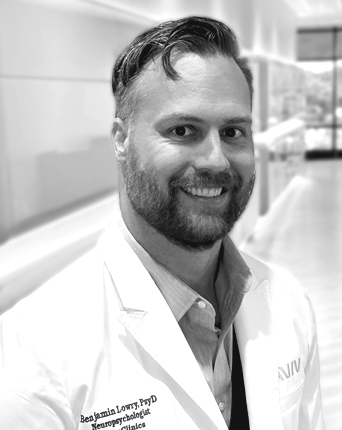Ben Lowry, PsyD
Neuropsychologist
Highlights:
- Psychotherapist with demonstrated proficiency serving multiple populations, including patients with mood, neurological, neurodevelopmental, neurocognitive, psychiatric, and other health-related disorders.
- Expertise in conducting neuropsychological evaluations across the lifespan (from pediatric to geriatric patients)
- Proficiency with Acceptance and Commitment Therapy, Cognitive Behavioral Therapy, and humanistic, existential, and interpersonal techniques.
- Demonstrated skills serving patients in outpatient, inpatient and telehealth settings
Education:
- Doctor of Psychology (PsyD) in Clinical Psychology with a concentration in Clinical Neuropsychology – Nova Southeastern University
- Bachelor of Science (BS) in Psychology – University of Lethbridge (Canada)
About Dr. Ben Lowry:
- As Aviv Clinics’ neuropsychologist, Dr. Benjamin Lowry works with the neuropsychology team to implement the psychological and cognitive components of the Aviv Medical Program. His activities at Aviv include clinical interviewing, administering neuropsychological tests, managing cognitive training protocols, conducting neurorehabilitation interventions, and administering psychotherapy.
- He first became interested in neuropsychology while serving as a missionary, where he discovered he enjoyed counseling those he served. Once he began studying psychology in college, he became fascinated with brain-behavior relationships. Those experiences led Dr. Lowry to a graduate program that offered specialty training in neuropsychological assessment and intervention.
- Dr. Lowry feels strongly about prioritizing people and facilitating personal success. He feels personally rewarded by the relationships he builds with clients and in being part of the life-changing transformations that Aviv Clinics’ clients make.

Research, Citations, and News
- Archives of Clinical Neuropsychology: Age-based Differences in Relative rCBF in ADHD Adults: An Exploratory SPECT Study
- National Academy of Neuropsychology Conference: SPECT Differences in Cerebral Blood Perfusion with Individuals Diagnosed with Impulse Control Disorders and Cluster B Personality Disorders
- Archives of Clinical Neuropsychology: SPECT Cerebral Blood Flow Differences Between Self-Reported Post-Traumatic Stress Disorder and Obsessive-Compulsive Symptomatology
- Archives of Clinical Neuropsychology: The Relationship of BMI on Neuropsychological Outcomes in Older Adults with Alzheimer’s Dementia
- Handbook of Behavioral Criminology: Role of Neurobiological Factors (book chapter)

“I joined the Aviv Clinics team because I was motivated by both the fascinating clinical opportunities and innovative and evidence-based treatment protocol. Our services target large gaps in traditional healthcare services by optimizing current health and minimizing future decline, rather than taking a reactive approach to health.”